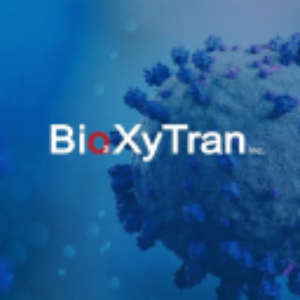Bioxytran’s Cancer Preprint Reveals Potential to Enhance Most Immunotherapy Drugs
Rhea-AI Summary
Bioxytran (OTCQB: BIXT) has released a preprint article exploring the potential enhancement of cancer immunotherapy through galectin-3 modulation. The research focuses on improving Immune Checkpoint Inhibitors (ICIs) effectiveness in cancer treatment. Key findings show that high galectin-3 levels correlate with treatment failure, with 90% of Non-Small Cell Lung Cancer patients with elevated levels failing to respond after three treatments.
The study reveals that galectin-3 protein interferes with ICI therapy by occupying the antibody's PD-1 receptor binding site, preventing effective treatment. However, in vitro tests indicate that galectin-3 antagonists could potentially reverse this effect. The company also published a presentation on cancer metastasis, highlighting the 'Galectin Effect' as cancer's primary defense mechanism against immune response.
Positive
- Discovery of galectin-3's role in immunotherapy resistance provides new treatment pathway
- In vitro tests show potential for galectin-3 antagonists to improve cancer treatment effectiveness
- Research supported by over 4,000 peer-reviewed articles on galectins in cancer
Negative
- 90% treatment failure rate in NSCLC patients with high galectin-3 levels
- Current immunotherapy treatments shown to be ineffective against high galectin-3 expressing tumors
News Market Reaction
On the day this news was published, BIXT gained 4.68%, reflecting a moderate positive market reaction.
Data tracked by StockTitan Argus on the day of publication.
BOSTON, MASSACHUSETTS, Jan. 10, 2025 (GLOBE NEWSWIRE) -- BIOXYTRAN, INC. (OTCQB: BIXT) (the “Company”), a clinical stage biotechnology company developing oral and intravenous drugs to treat viral diseases, fibrosis, stroke, dementia, and Alzheimer's disease, announced its preprint article titled “Immune Checkpoint Inhibitors (ICI): Prospects for Galectin-3 Modulation to Increase Objective Response Rate (ORR) and Remission-free Survival in Oncology Patients” (the “Article”) authored by Dr. Adesuyi Ajayi, Dr. David Platt, and Andrew Blumenthal. The preprint reviews detailed theories regarding the resistance to ICI therapy and how galectin-3 contributes to resistance.
Immune Checkpoint Inhibitors (ICI): Prospects for Galectin-3 Modulation to Increase Objective Response Rate (ORR) and Remission-free Survival in Oncology Patients
http://dx.doi.org/10.13140/RG.2.2.31077.31202
The Article discusses the potential of immune checkpoint inhibitors (ICIs) in cancer treatment and explores how galectin-3 modulation might enhance ICI effectiveness. It highlights the importance of overcoming resistance to ICIs and improving patient outcomes by targeting galectin-3, which could increase the objective response rate (ORR) and remission-free survival in oncology patients. Galectin-3 is also a powerful predictive biomarker of ICI failure in Non-Small Cell Lung Cancer (NSCLC) where
ICI resistance due to galectin-3 in the tumor microenvironment is also due to the galectin-3 glycoprotein occupying the antibody’s PD-1 receptor binding site. This was confirmed by Surface Plasmon Resonance (a technique used to study the interactions between molecules by detecting changes in the refractive index near a sensor surface) - and cyrogenic electron microscopy. The galectin-3 protein binds in such a way that it prevents ICI’s from binding to PD-1. This leaves the receptor open to PD-L1 binding which switches off the T-Cells. In vitro tests show that galectin-3 antagonists could reverse this effect.
The Company also published its cancer metastasis presentation titled “Galectin Antagonists in Cancer.” The presentation goes over the various ways that cancer tricks the immune system and the current modalities being used to fight cancer. The “Galectin Effect” was highlighted as cancers primary defense mechanism to downregulate and cloak the cancer from immune response. Shortcomings in current treatments are addressed as well as innovative approaches to address the deficiencies. The heart of the presentation shows that galectins play a key role in the tumor microenvironment, promoting tumor growth, metastasis, and immune suppression. Galectin antagonists may hold the key to overcoming these effects and improve efficacy of other cancer treatments.
Galectin Antagonists in Cancer
https://tinyurl.com/bdcth9j2
"The magnitude of this breakthrough in cancer research cannot be overstated," said Dr. David Platt, CEO of Bioxytran Inc. "Our findings herald a significant shift in cancer treatment paradigms. We've developed a robust theory of cancer and metastasis, identifying Galectin-3 as a pivotal driver of disease progression. This finding elucidates the variable responses in immunotherapy and the development of resistance in other cancer treatments. With over 4,000 peer-reviewed articles examining the role of galectins in cancer, one consensus is clear: they must be inhibited. Our team has synthesized this extensive body of research into the core insights presented in our preprint and cancer presentation. The data unequivocally supports the finding that combining galectin-3 antagonists can significantly enhance treatment response rates."
About Bioxytran, Inc.
Bioxytran, Inc. is a clinical stage biotechnology company pioneering a library of novel complex carbohydrate structures using artificial intelligence software that interprets the Nuclear Magnetic Resonance imaging of druggable targets like the galectin fold to create a rational drug design. The leading drug candidates vetted by in vitro testing, are capable of neutralizing viruses. The peer-reviewed discovery of the galectin fold located on the spike proteins of viruses such as COVID-19, RSV, and H1N1 demonstrate there exists a conserved region on the spike in which Bioxytran’s molecules achieve virus neutralization. The extent of the carbohydrate structure’s ability to neutralize untested viruses is unknown just like the initial discovery of antibiotics last century and its ability to treat a broad spectrum of bacterial infections. Applications of this platform technology extend to the treatment of significant unmet medical needs in virology, degenerative disease, and hypoxia. The leading drug candidate, Prolectin-M, is a new class of antiviral drug designed to antagonize galectins implicated in inflammatory, fibrotic, and malignant diseases. Bioxytran’s other development programs are for pulmonary fibrosis and stroke treatment. More information can be found at www.bioxytraninc.com
Investor Relations
Michael Sheikh
509-991-0245
mike.sheikh@bioxytraninc.com
Forward-Looking Statements
This press release includes forward-looking statements as defined under federal law, including those related to the performance of technology described in this press release. These forward-looking statements are generally identified by the words “believe,” “expect,” “anticipate,” “estimate,” “intend,” “plan,” and similar expressions, although not all forward-looking statements contain these identifying words. Such statements are subject to significant risks, assumptions and uncertainties. Known material factors that could cause Bioxytran’s actual results to differ materially from the results contemplated by such forward-looking statements are described in the forward-looking statements and risk factors in the Company’s Annual Report on Form 10-K for the fiscal year ended December 31, 2023, and those risk factors set forth from time-to-time in other filings with the Securities and Exchange Commission. Bioxytran undertakes no obligation to correct or update any forward-looking statement, whether as a result of new information, future events, or otherwise, except to the extent required under federal securities laws.







